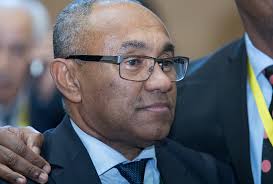By Andrew Warshaw
March 17 – When Madagascar’s Ahmad Ahmad paid tribute to his predecessor Issa Hayatou and spoke of a new dawn for African football after clinching the most seismic of election victories, it brought to mind another one-sided presidential ballot.
Within minutes of clinching power, Ahmad’s remarkable triumph over the man who has led African football for three decades was already being compared with that of UEFA’s Aleksander Ceferin just six months ago.
Both were hardly known previously outside their native countries yet each took full advantage of the prevailing winds that have increasingly been sweeping away age-ism, patronage, cronyism and elitism.
“This is sweet victory,” said Ahmad, a government minister in Madagascar and the president of the country’s federation, in his hour of success. “When you work hard for years and months and you succeed, that is great.”
It is another election, however, one that took place just over a year ago, which perhaps explains how Ahmad, who only took on Hayatou because no-one else dared to, dismantled the 70-year-old’s seemingly impregnable power base to take over FIFA’s biggest single confederation.
Football politics is full of Shakespearean-type plots and bitter twists of fate. Whether or not Ahmad was encouraged to stand by Gianni Infantino, the fact that he had the FIFA president’s tacit support (even though Infantino denies it) says much about the margin of his 34-20 victory in Addis Ababa.
Despite being Infantino’s senior vice president, Hayatou was never going to be an ally once he had backed the wrong horse (Asian football boss Sheikh Salman) at the FIFA presidential ballot 13 months ago. From that moment on, his own position became increasingly vulnerable, evidenced by being removed as head of FIFA’s highly influential finance committee by Infantino who now has an instantly more palatable African leader at his top table.
While Infantino diplomatically declined to comment on the election result saying it was CAF business, Hayatou supporter Opes Manuel Nascimento, the head of the Guinea-Bissau soccer federation, pulled no punches. “It is annoying that a FIFA president influenced this election for his own interest,” he said.
Hayatou was clearly rattled at his removal after 29 years at the helm. “People say I am too old at 70. But Blatter was re-elected at 78. They want me to go now? Ok, I am going,” he said as he was led away by the arm by one of his aides.
While Ahmad’s campaign team had predicted the result, there were growing signs that Hayatou’s grip on power was loosening as he sought an eighth term. He may have stood in as acting FIFA president in the wake of the 2015 corruption scandal and he may have only twice before been challenged, each time winning by a landslide.
But as his old buddy Blatter can testify only too well, you can’t hang on indefinitely. This time Hayatou was beaten by a man who campaigned to modernise CAF and make it more transparent and trustworthy – familiar pledges in the new world order of football politics.
“This is a change which came after too long,” said Swaziland’s Mahlaba Mamba said. “From 1988 to 2017 … that’s too long.”
They were sentiments expressed by many others.
Seyi Akinwunmi, vice president of the Nigeria Football Federation, called Hayatou a “colossus who has bestrode African football for decades”, before adding: “Africans never forget their elders. An elder has been defeated today, but he’s still an elder. The world has moved on, we really need energy. And the truth is Issa Hayatou is almost 70. There’s only so much really that he can do.
One of Ahmad’s priorities will be to set up a new code of ethics, right at the time when Hayatou and CAF secretary general Hicham el Amrani potentially face criminal prosecution in Egypt over the confederation’s new US$1 billion marketing and television rights deal.
“What made me very proud today, proud and at the same time happy, is the victory of democracy in Africa … African football showed today that we respect democracy,” he told a press conference.
“I will be a president who will share the burden of the CAF finances with the presidents of the member associations. This body, called the Special College of Presidents, will meet twice a year and will dictate the various expenses rules and general operations of CAF,” he pledged.
Ahmad has also promised to streamline the process of selling broadcast rights for continental championships to counter accusations levelled against Hayatou that he influenced the awarding of the lucrative deals. “All calls for interests on TV rights of all the competitions and marketing must be done and communicated to the public.
But although Ahmad gives African football a new start, there are those who believe he may not last the course because of alleged previous misdemeanours including asking for money from disgraced former FIFA presidential candidate Mohamed bin Hammam.
Emailed correspondence between someone of his name and an aide to bin Hammam was published in 2014 by British newspaper The Sunday Times. The Bin Hammam aide concerned, Najeeb Chirakal, was only recently banned for life by the FIFA ethics committee for involvement in unethical payments made on behalf of a third party to football officials between 2009 and 2011.
Will Ahmad be next?
Contact the writer of this story at moc.l1745289529labto1745289529ofdlr1745289529owedi1745289529sni@w1745289529ahsra1745289529w.wer1745289529dna1745289529

